Africa must break chains of neo-colonialism, build from within, Ras Mubarak
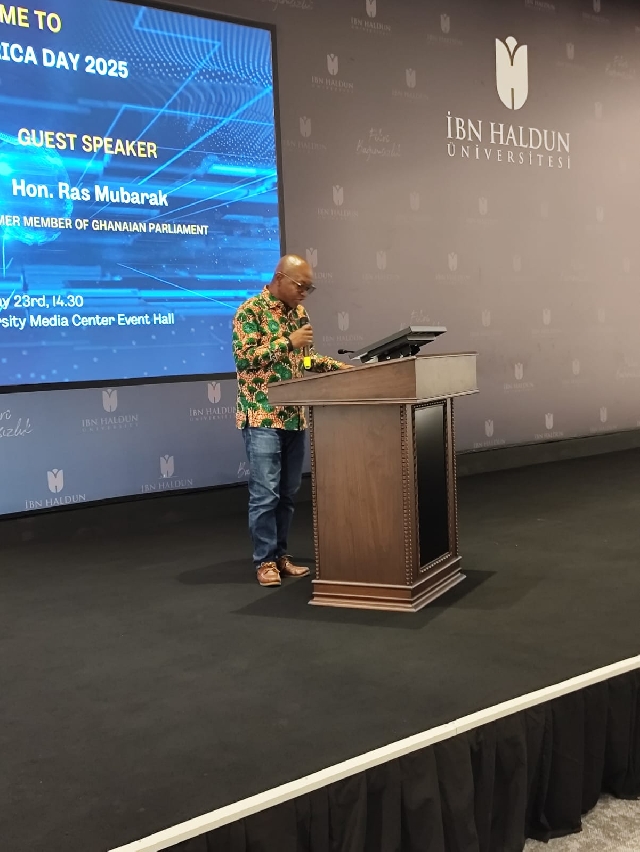 Ras Mubarak
Ras Mubarak
Former Ghanaian Member of Parliament Ras Mubarak has issued a passionate call for African youth to rise up and take charge of the continent’s destiny by rejecting neo-colonial dependencies and building homegrown solutions rooted in Pan-African ideals and South-South cooperation.
Speaking at Ibn Haldun University in Istanbul on African Union (AU) Day, Mubarak addressed a crowd of African students and Turkish academics in a speech titled “Empowering Africa’s Future: Breaking Free from Neo-Colonialism and Embracing Pan-Africanism and South-South Cooperation.”
The former lawmaker challenged Africa’s current generation to redefine the continent’s future by shedding foreign influence and designing systems of governance that reflect African values and realities.
“What we say about Africa today is what we believed yesterday. What you do about Africa tomorrow is what will define our continent for generations,” he told the audience.
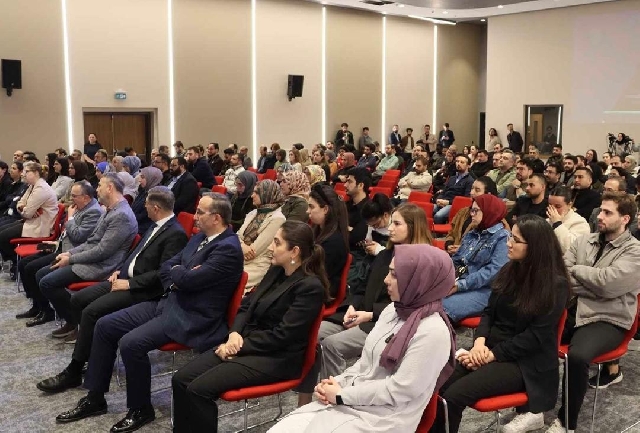
Mubarak decried Africa’s continued economic and political dependence on former colonial powers, describing the legacy of foreign domination as one that has merely evolved rather than disappeared. Using West Africa’s stalled single currency project as an example, he blamed the delay on a lack of political will and subservience to Western interests.
“Our leaders are too often beholden to foreign interests. They dance to the tune of their puppet masters in Washington, Brussels, London, and Paris who benefit from our division and dependence,” he said.
Highlighting the burdens of intra-African travel, trade, and migration, Mubarak underscored the absurdity of African goods being routed through Europe before reaching neighboring states and the continued need for visas between African countries.
“This is not logistics; this is the legacy of a colonial system that was never dismantled, only rebranded,” he said.
The speech also spotlighted what Mubarak described as a “political and psychological awakening” in the Sahel region, particularly in Burkina Faso under Captain Ibrahim Traoré. Though unelected, Traoré was praised by Mubarak for reclaiming national sovereignty by removing foreign troops and renegotiating exploitative mining contracts.
“He is not celebrated because he seized power. He is celebrated because he is using power to serve, not to submit,” Mubarak declared, adding that traditional Western models of democracy have failed to deliver dignity for many African nations.
While asserting that democracy remains important, Mubarak stressed that true democracy must prioritise independence and dignity rather than foreign validation.
“The Sahel is telling us something urgent... This Sahelian wave is not instability — it is clarity. It is not a rebellion; it is a rebirth.”
Mubarak urged African youth to reject Western-imposed narratives and instead draw inspiration from indigenous knowledge and partnerships with the Global South. He called for deeper cooperation with countries like China, Russia, Brazil, and Turkey — nations he said offer more equitable and respectful engagement with Africa.
Throughout his speech, Mubarak emphasised the critical role of Africa’s youth in transforming the continent, warning them against being passive voters and encouraging them to become active agents of change.
“You are not the leaders of tomorrow. You are the leaders of now,” he said. “If you don’t lead, others will keep misleading.”
The former MP concluded with a call for solidarity with Palestinians, drawing a parallel between Africa’s history of colonisation and the plight of the Palestinian people. In a bold statement, he described Israel as a “gangster terrorist entity” and urged African students to be vocal in championing Palestinian liberation.
“Africans should be at the forefront of championing for the liberation of Palestine... Without apology I say this to you — Israel is a gangster terrorist entity whose leaders must face justice for war crimes and crimes against humanity.”
Ending on a hopeful note, Mubarak said that despite current challenges, Africa’s future remains bright if its people unite to confront the continent’s problems on their own terms.
“We may be facing challenges today, but we won’t be facing challenges forever,” he said. “Let us work together to build a brighter future for Africa — a future that is shaped by our own values, our own cultures, and our own aspirations.”
The speech has since sparked discussion across African student circles in Turkey and beyond, reinforcing the growing appetite among the continent’s youth for self-determination, internal collaboration, and genuine sovereignty.
Read Ras Mubarak’s full speech below:
Speech by Hon. Ras Mubarak Former Member of Parliament, Ghana At Ibn Haldun University, Istanbul, Turkey.
Date: 23rd May 2025.
Topic: Empowering Africa’s Future: Breaking Free from Neo-Colonialism and Embracing Pan Africanism and South-South Cooperation
Good afternoon, ladies and gentlemen, distinguished faculty staff, and most importantly, dear African students of Ibn Haldun University. It is a tremendous honour and joy to join you today as we commemorate A U Day; a day that reminds us not just of how far we’ve come, but how far we still must go. I have a few minutes to speak to you about Africa’s future through the lens of Pan-Africanism and South-South cooperation but in truth, I am here to speak directly to you, the African youth, because you are the future.
What we say about Africa today is what we believed yesterday. What you do about Africa tomorrow is what will define our continent for generations.
Let me begin with a story, one that reflects how much work lies ahead. A group of 54 professors from across Africa were invited to board a brand-new airplane for a flight abroad. Once they were all seated, the organizers announced that the aircraft had been designed and built entirely by their own African students. Shocked and alarmed, they all jumped and run out of the plane leaving only one professor from Ghana, who was very calm and composed. When he was asked why he was still seated, he said "if the plane was really made by our own students, trust me it won't even start."
As humorous as it may sound, this story sumps up the state of despair about Africa and the lack of confidence in Africa’s abilities. It reveals something deeply troubling - the crippling lack of confidence in African competence.
The story may be fictional, but the despair it echoes is very real. Many of our people, especially our brightest minds, are consumed by hopelessness not because we lack resources, but because we lack leadership.
We lack faith in our systems. And most importantly, we’ve been trained to doubt ourselves. Let’s take West Africa as an example. For decades, ECOWAS has spoken about launching a single currency called the Eco. I was a teenager when that conversation began. Today, I’ll be 46 on 3rd June, and ECOWAS leaders are still talking. Why hasn’t it happened? One reason: a lack of political will. Our leaders are too often beholden to foreign interests. They dance to the tune of their puppet masters in Washington, Brussels, London and Paris who benefit from our division and dependence.
But this is where you come in. You, my dear African brothers and sisters of Ibn Haldun University - You are well-educated, well-connected, and intellectually equipped like no generation before. You hold the keys to Africa’s transformation. You are not the leaders of tomorrow. You are the leaders of now. You must no longer settle for casting votes for stooges and placeholders. You must rise and represent. Represent your families, your communities, and your continent. Because here's the truth: If you don’t lead, others will keep misleading.
It is unacceptable that a student in Accra pays $860 to fly to Abuja yet can travel to Brussels for far less. It is outrageous that goods from Ghana must first go to Europe before reaching nearby Liberia despite the fact that Accra to Monrovia is under 500 kilometres away. This is not logistics; this is the legacy of a colonial system that was never dismantled, only rebranded. Why do we need visas to visit each other? Why should a Ghanaian require a visa to visit Botswana, or a Nigerian to visit Egypt? What’s the point of African unity if we can’t even move freely among ourselves? These are the scars of neo-colonialism, a system that keeps Africa in shackles while telling us we are free.
For centuries, our continent has been exploited. Colonized. Dismembered. And today, we remain dependent our minerals mined by foreigners. Our currencies pegged to colonial powers, and our policies written with foreign pens. That is why young Africans across the continent are drawing inspiration from what is happening in the Sahel.
We are witnessing a political power shift. We are seeing a psychological awakening in countries like Mali, Niger, and most notably, Burkina Faso. These nations, long treated as security pawns in a game of foreign interests are beginning to reclaim their sovereignty.
For decades, they were told that salvation lay in hosting foreign military bases, signing unequal trade deals, and borrowing endlessly from institutions that prescribe austerity but never prosperity.
Then came a different kind of leader. Comrade Captain Ibrahim Traoré. He’s not democratically elected. But he is confronting the failures of decades of so-called democracy that delivered no dignity.
In less than two years, he has dared to do what generations of elected leaders have refused and failed to do. He has expelled foreign troops who brought neither peace nor partnership. Ibrahim Traore has reclaimed Burkina Faso’s gold mines from exploitative contracts. And he speaks boldly about the right of Africans to chart their own future.
Traoré's leadership may challenge traditional norms of governance, but it resonates with a generation that is tired of cosmetic democracy and elite complicity. He is not celebrated because he seized power. He is celebrated because he is using power to serve, not to submit. He is returning Burkina Faso’s sovereignty to its people and in doing so, he has awakened the conscience of a continent.
Let’s be clear: democracy matters. But real democracy must be rooted in dignity, political and economic independence, and the will of the people not in foreign validation or scripted elections.
The Sahel is telling us something urgent. It is showing us that the next phase of African liberation will not come with approval from Paris or Washington. It will come from a generation that dares to believe that we can govern ourselves, protect ourselves, and empower ourselves without permission.
This Sahelian wave is not instability it is clarity. It is not a rebellion; it is a rebirth. And now, more than ever, Pan-Africanism must be the compass that guides us forward.
Distinguished ladies and gentlemen, Pan-Africanism is not just an ideology; it is a call to action. It is a reminder that we are stronger together, that our diversity is our strength, and that our collective voices can shape the world.
For far too long, we have looked to the West for solutions, for validation, and for inspiration. We have been taught to believe that Western ways are superior, that Western knowledge is the only knowledge that matters. That is nonsense. That’s a lie. That’s brainwashing.
But I ask you, dear students, what about the knowledge of our ancestors? What about the wisdom of our elders? What about the innovations of our own people? The world has become a global village, as they say. And so, while we look to Africa for home-grown solutions, it is also time for us to shift our gaze to the East, to the Global South, where we can find partners who understand our struggles, who share our aspirations, and who are willing to collaborate with us as equals.
Countries like China, Russia, and Brazil are not just emerging economies; they are also beacons of hope for a more equitable world order. And that is why even a developed country like Turkey has applied to join the BRICS.
So, as you pursue your studies and your careers, I urge you to think critically about the world we live in. Question the status quo, challenge the dominant narratives, and seek out alternative perspectives. I want you to be bold, to be innovative, and courageous in your pursuit of knowledge and wisdom. Remember that you are not just students; you are the architects of Africa's future. You are the leaders who will shape the destiny of our continent.
So, I ask you to dream big, to imagine a world where Africa is at the forefront of global affairs, where African cultures are celebrated, and where African voices are heard. Let me say that no nation and continent is perfect. We have to strive for a perfect or better Africa. That duty of resetting Africa rests with all of us politicians, the academia, civil society, and the youth we must all make it our mission to lift our continent up, to heal the wounds of poverty, youth crime, food insecurity, climate change, deviant behaviour, social disorder, and deprivation wherever we may find it.
The prospect of building a fair and equal society for our people remains within our reach. As young people, our message to our leaders, both in government and opposition, is that we will fail if we spend half the time campaigning for the next election and fighting among ourselves instead of building consensus and solving the real issues. What the African youth cares about the most is a chance to get on in life a chance to acquire knowledge, skills, and the prospects of a better future and a life well lived. If we are going to meet these hopes, and live those dreams, then we must stand together in the task of building a better Africa. We may be facing challenges today, but we won’t be facing challenges forever.
There is hope my friends. There is hope, if we are all Ibrahim Traoré, or Nkrumah, Acheampong, and Lumumba. We can bring hope and aspiration to places where there is resignation and despair. In conclusion, I leave you with the words of Kwame Nkrumah, the great Pan-Africanist leader: “The independence of Ghana is meaningless unless it is linked with the total liberation of the African continent.” Let us work together to build a brighter future for Africa; a future that is shaped by our own values, our own cultures, and our own aspirations. Let us look to the East, to the Global South, and to each other for inspiration, for collaboration, and for collective action.
Finally, as I resume my seat, I want us to spare a thought for Palestinians. Africans, who have been through slavery, colonialism, and neo-colonialism, should understand better the oppression of Palestinians by these barbarians who call themselves Israelis. Africans should be at the forefront of championing for the liberation of Palestine, and calling on boycotts of apartheid Israel. Without apology I say this to you - Israel is a gangster terrorist entity whose leaders must face justice for war crimes and crimes against humanity.
Asante Sana. Naa Godey, Shukran, M’pagya. I thank you - And may our African students and youth rise, not just as witnesses to history, but as its authors! May God bless Africa, may God bless the Turkish people, may God bless all who seek genuine partnership with Africa. Long live Palestine and may God bless us all. አመሰግናለሁ (Ameseginalehu), Teşekkürler
Use this speech to write a news story from the angle that Africa must break the chains of neo-colonialism and look internally for solutions to its own problems and design its own governance systems
Source: ClassFMonline.com
Trending News

Health Minister swears in new boards to drive key reforms in health sector
09:55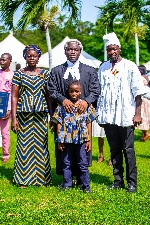
From herding cattle to Yale: Frederick Adongo's inspiring journey backed by Alhaji Agongo's philanthropy
07:56
Apple iPhone designer Jony Ive joins OpenAI in $6.5bn deal
13:48
Wontumi granted EOCO bail, but unable to meet bail conditions-Lawyer
08:11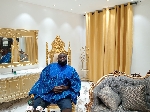
Ngleshie-Laafa-Barima Chief challenges Nungua Mantse over statement on enstoolment authority
05:47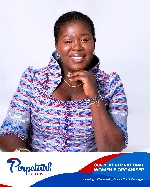
Perpetual Ekua Lomokie aims to be youngest to hold the position of NPP Women Organiser
11:10
Full operations resume at Ghana embassy in Washington DC Thurs. May 29, Foreign Affairs Ministry says
20:26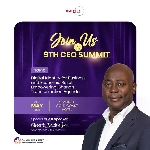
Margins ID Group CEO to highlight innovation in identity systems at 9th CEO Summit
04:10
Cedi appreciation attributed to deliberate policy measures by Mahama's administration – Sammy Gyamfi
10:59
TEAP calls for revocation of Godwin Armah's mining licence over alleged environmental degradation
20:09




